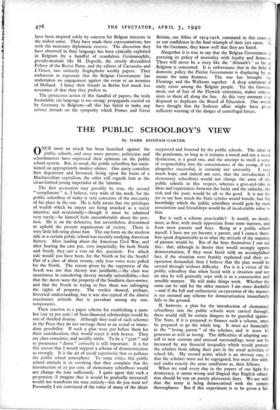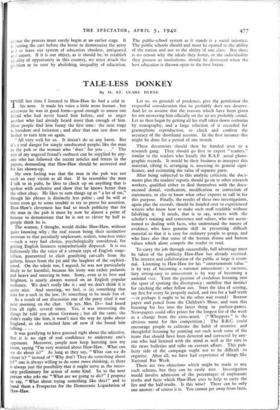THE PUBLIC SCHOOLBOY'S VIEW
By MARK BONHAM-CARTER
ONCE more an attack has been launched against the public schools, and once more parents, politicians and schoolmasters have expressed their opinions on the public school system. But, as usual, the public schoolboy has main- tained an appropriately modest silence. One party considers him degenerate and favoured, living upon the fruits of a Machiavellian capitalism, the other still regards him as the clean-limbed young imperialist of the 'nineties.
The first accusation may possibly be true, the second " compliment " is, I believe, very wide of the mark, for the public schoolboy of today is very conscious of the insecurity of his place in the sun. He is fully aware that the privileges of wealth which he enjoys are being attacked as a social injustice, and occasionally—though it must be admitted very rarely—he himself feels uncomfortable about his posi- tion. He is on the defensive, but nevertheless determined to uphold the present organisation of society. There is very little left-wing about him. The top form on the modern side at a certain public school was recently studying American history. After reading about the American IGO War, and after hearing the case put, very impartially, for both North and South, they cast a vote on this question: For which side would you have been, for the North or for the South? Out of a class of about twenty, only four votes were polled for the North. The reason given by the supporters of the South was not that slavery was justifiable,—the class was unanimous in considering slavery morally unjustifiable,—but that the slaves were the property of the Southern slave-owner, and that the North in trying to free them was infringing the rights of property. The verdict showed, perhaps, historical understanding, but it was also typical of the almost reactionary attitude that is prevalent among my con- temporaries.
Their reaction to a paper scheme for establishing a num- ber (say 25 per cent.) of State-financed scholarships would be one of shocked dismay. Although they read of such schemes in the Press they do not envisage them as an actual or imme- diate possibility. If such a plan were put before them for their consideration, they would reject it with horror. They are class-conscious, and socially snobs. To be a " gent " and to pronounce " down " correctly is still important. It is for this reason that I would support a scheme of democratisation so strongly. It is the air of social superiority that so pollutes the public school atmosphere. To some critics this public school attitude is so revolting that they complain that the introduction of 25 per cent. of elementary schoolboys would not change the tone sufficiently. I quite agree that such a proportion (I imagine that it would be gradually increased) would not transform the tone entirely—but do you want to? Personally I am convinced of the value of many of the ideals supported and fostered by the public schools. The ideal of the gentleman, so long as it remains a moral and not a social distinction, is a good one, and the attempt to instil a sense of responsibility into the consciousness of the young, if not altogether successful, is certainly not unworthy. I very much hope, and indeed am sure, that the introduction of elementary schoolboys would not change the aims of the public schools in this respect, whereas a give-and-take in ideas and experiences between the lucky and the unlucky, the rich and the poor, would be all to the good. It is not for me to say how much the State scholar would benefit, but the knowledge which the public schoolboy would gain by such associations and friendships would be of incalculable value to him.
But is such a scheme practicable? It would, no doubt, meet, at first, with much opposition from some masters, and from most parents and boys. Being at a public school myself, I have not yet become a parent, and I cannot there- fore speak dogmatically as to what the attitude of the majority of parents would be. But of the boys themselves I can say this: that, although in theory they would strongly oppose democratisation, if they were faced with an accomplished fact, if the situation were frankly explained and their co- operation demanded, then I believe that the plan would be carried through without difficulty. For it is a virtue of the public schoolboy that when faced with a situation and not an idea he will generally cope with it in a constructive and sensible manner. He will make things work. Whether the same can be said for the older masters I am more doubtful —and if the full and enthusiastic co-operation of the masters is not ensured any scheme for democratisation immediately falls to the ground.
If, however, a plan for the introduction of elementary schoolboys into the public schools were carried through, there would still be certain dangers to be guarded against. The State, if it is prepared to finance such a scheme, must be prepared to go the whole hog. It must act financially as the " loving parent " of the scholars, and it must be generous as well as loving. The difficulties of adapting one- self to new customs and unusual surroundings must not be increased by any financial inequality which would prevent the scholars from taking their part in the usual activities of school life. My second point, which is an obvious one, is that the scholars must not be segregated, but must live with, and under exactly the same conditions as, their fellows.
When we read every day in the papers of our fight for democracy, it seems wrong and illogical that English educa- tion should be run on purely plutocratic lines. We are told that the army is being democratised with the utmost thoroughness. But if this experiment is to be given a fair dunce the process must surely begin at an earlier stage. It is putting the cart before the horse to democratise the army ar.,1 to leave our system of education obsolete, antiquated and unjust. If it is our object, as it should be, to establish equality of opportunity in this country, we must attack the problem at its root by abolishing inequality of education. The public-school system as it stands is a social injustice. The public schools should and must be opened to the ability of the nation and not to the ability of one class. But there is no reason why the ideals they foster, or the individuality they possess as institutions, should be destroyed when the best education is thrown open to the best brains.















































 Previous page
Previous page